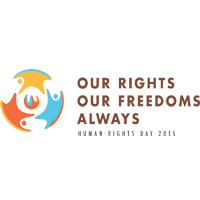Republic of Serbia Has No Answer for Human Rights Violations Committed during 1990’s
 On the occasion of marking International Human Rights Day, the Humanitarian Law Center (HLC) would like to remind the public that the Republic of Serbia has an obligation to apply the provisions of international human rights law to cases of systematic human rights violations during the 1990’s, and emphasizes that the position of institutions towards these obligations represents a reflection of sincerity of the political authorities in the process of building a democratic society and a culture of human rights.
On the occasion of marking International Human Rights Day, the Humanitarian Law Center (HLC) would like to remind the public that the Republic of Serbia has an obligation to apply the provisions of international human rights law to cases of systematic human rights violations during the 1990’s, and emphasizes that the position of institutions towards these obligations represents a reflection of sincerity of the political authorities in the process of building a democratic society and a culture of human rights.
The Republic of Serbia is a signatory to almost all relevant international agreements on the protection of human rights and additional protocols – including the International Covenant on Civil and Political Rights (2001), the European Convention for the Protection of Human Rights and Fundamental Freedoms (2004), the Convention Against Torture (2001), and the Convention for Protection from Enforced Disappearances (2011), which encompass the obligation of states to prosecute perpetrators of human rights violations and secure adequate satisfaction, support, and acknowledgement for victims.
The prosecution of perpetrators of war crimes and other serious human rights violations committed in the context of the armed conflicts of the 1990’s is slow and, to a large extent, inefficient. The result of the twelve years of prosecution of war crimes in Serbia is 46 perpetrators convicted by a final judgment. The trend of a decreasing number of indictments reached its lowest point in 2015, which is ending without a single confirmed indictment for war crimes. The number of indictments filed in cases of crimes committed in Kosovo is particularly small, despite the final judgments rendered before the ICTY, which established the responsibility of political, military, and police leadership of Serbia for crimes committed against Albanian civilians. The courts usually render lenient sentences to perpetrators. Apart from this, these individuals enjoy privileges while serving their prison sentences, which is most inappropriate, bearing in mind the serious nature of the criminal offences they have been convicted of. High-ranking military and police officers have been practically granted amnesty from their responsibility, because the Office of the War Crimes Prosecutor rarely files indictments against this category of perpetrators, and the notion of command responsibility, which has been envisaged by international and domestic law, has not been applied once to date. The system of support for victims and witness protection does not create an atmosphere in which victims and witnesses feel safe to speak and, because of this, they have often preferred to remain silent. Instead of being directed at establishing responsibility for the crimes committed, political support is directed towards the perpetrators, organisers, and commanders of crimes. The Office of the War Crimes Prosecutor suffers political pressures and threats coming from the highest government levels.
Most civilian victims of war in Serbia do not enjoy any of the rights or support of institutions due to the existence of the discriminatory legal framework, which deprives them of the right to reparation. The Law on Civilian Invalids of War passed in 1996 does not acknowledge the status of civilian victim to the families of the disappeared, victims of sexual violence, victims of Serbian security forces, victims with a lower percentage of physical disability or with psychological consequences of the violence suffered, and other categories of victims. The respective Ministry initiated the procedure of drafting a new Bill in late 2014, but instead of improving the protection of civilian victims of war, the Bill retained the majority of discriminatory provisions from the existing Law. The announced Bill on the Rights of War Veterans, Military Invalids, Civilian Invalids of War and Members of their Families represents a patchwork example of the lack of respect for international provisions and standards of protection of human rights shown by the institutions of Serbia.
Victims of war crimes and serious human rights violations also have to deal with the obstruction of court proceedings launched on the basis of lawsuits claiming material damages. These proceedings are unreasonably long; victims’ lawsuits have been dismissed in a great number of cases on the basis of the effects of the statute of limitations or the courts’ dismissal of evidence, while in rare judgments upholding victims’ claims, the compensation amounts awarded are humiliating.
Institutions do not recognize the importance of conducting background checks of their employees and, therefore, they agree to the conspiracy of silence about war crimes. They provide shelter to individuals who are under serious suspicion of having committed some of the most serious war crimes, and they conceal documents which may be helpful in clarifying circumstances regarding mass graves and responsibility for crimes. The first and only Lustration Law ceased to exist in June 2013 without having been enforced in a single case.
This position of Serbia taken towards international obligations with regard to the protection of the rights of victims of human rights violations and restoration of the rule of law was subject to criticism by the UN Committee Against Torture and the UN Committee for Protection From Enforced Disappearances, the Council of Europe, the European Commission and the European Parliament, as well as the human rights organizations Amnesty International and Human Rights Watch.
The HLC calls upon the institutions of the Republic of Serbia to demonstrate their dedication to the protection of human rights and fulfilment of international obligations by taking concrete actions, which would be visible to thousands of victims of serious crimes committed by Serbian forces. In particular, the state particularly adopt a national strategy for the prosecution of war crimes, which would resolve serious systematic problems in this area; it should also pass the Model Law on the Rights of Civilian Victims of Human Rights Violations in Armed Conflicts and in Relation to Armed Conflicts in the Period 1991-2001, and implement institutional reform by removing individuals responsible for the organization, execution and concealment of crimes from institutions, thus preventing further obstructions to fact-finding and establishing justice for the crimes committed in the past.
The process of European integration may offer the framework for designing and implementing reform in these areas, followed by the introduction of all transitional justice mechanisms in the content of Chapter 23, relating to the judiciary and fundamental rights.







